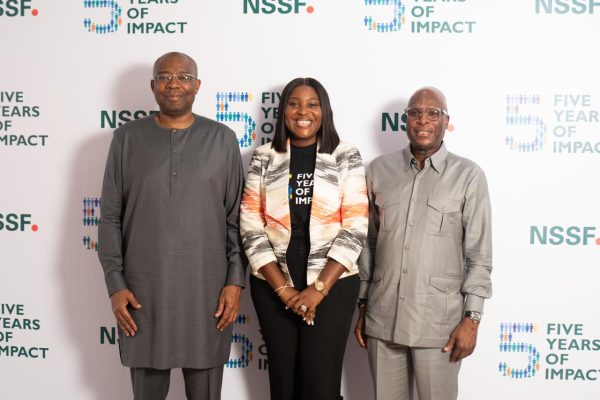…with 31 million stories on solution-driven advocacy
Focused on health-equity as an organisation with a clear mandate to address Nigeria’s most pressing health issues through youth advocacy and policy development, The Nigeria Solidarity Support Fund (NSSF) marked its fifth anniversary in Lagos.
With the theme, ‘Five Years, Thirty-One Million Stories’, the event celebrated the Fund’s impact on more than 31 million Nigerians while also unveiling a sharpened focus on health equity and youth-led solutions for the years ahead.
Board Chairman, Mr. Tunde Folawiyo, opened the gathering with words that brought the theme to life. “Our anniversary theme, Five Years, Thirty-One Million Stories, reminds us that every data point is a mother, a child, a family, a future. This moment is both a celebration and a recommitment.”
The anniversary was not only about reflection but also about numbers that speak to measurable change. Vice Chairman of Global Citizen and NSSF Board Member, Mr. Aigboje Aig-Imoukhuede, detailed the Fund’s achievements over the past five years. He said more than 22.56 million Nigerians have been educated on preventive health measures, while 12,000 frontline health workers have been trained. In addition, 4.98 million people were vaccinated against COVID-19; 156,125 children under five were immunised, and 20,651 pregnant women received tetanus-diphtheria vaccines. Beyond clinical interventions, he noted that 562 young Nigerians were trained as advocates through the WeNaija Youth Programme, and a further 1,855 were mobilised nationwide.
For Aig-Imoukhuede, the story of the Fund’s next phase lies in its commitment to health equity. “Health equity, as the name suggests, is about ensuring that healthcare and the impact of health investment goes to not just everybody, but especially to those who, for whatever reason, or maybe just because of social causes, are constrained benefiting from healthcare,” he explained.
He also highlighted how women often face the deepest inequities when it comes to access. “In Nigeria, less than seven percent of our population has access to health insurance. So, 70 percent of healthcare comes from out-of-pocket expenditure. Now think about who manages the budget of the household. I can tell you; I am married and can tell you it is my wife. So, who is the last person to get the benefit of the out-of-pocket expenditure? It is the wife, it is the woman, who is also the mother,” he observed.
“It just gives you an idea of how you just take things for granted and therefore, when you think about health equity is simply about correcting the disparities that life has unfortunately thrown up in terms of those who get access to healthcare versus those who don’t.”
As part of the milestone celebration, NSSF also announced a rebrand. Managing Director and CEO, Dr. Fejiro Chinye-Nwoko said, “Going forward, the organisation will simply be known as NSSF across all its communications. For the decision represents clarity of vision and a stronger posture. Five years ago, we began as an emergency response. Today, we stand as a health-equity organisation with a clear mandate to address Nigeria’s most pressing health issues through youth advocacy and policy development. Our work is about turning voices into evidence, and evidence into decisions that expand access to care, especially for those historically left behind,” she said.
She further explained that NSSF’s new strategy will be guided by two major strands. The first will focus on policy engagement, evidence generation, and system-level advocacy. The second, through the WeNaija programme, will mobilise young Nigerians to champion health issues, raise awareness, and contribute directly to solutions in their communities.
In her closing remarks, Chinye-Nwoko offered gratitude to the people and partners who have supported the Fund’s journey. “I would like to thank our team for doing so much work. I would stress that it is not easy working for a non-profit, but there is a heart that works for a non-profit, and a heart to give above and beyond. That is the heart that we have with NSSF,” she said.
She also thanked the advisory board, the media, the youth population, partners, and every Nigerian who has engaged with their mission. “There are people who benefited from our programmes, we care for you, and I think it is a compliment for all of us that we will continue to advocate, change policy, and ensure that vulnerable children get good quality care.”



